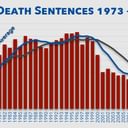USA Today
Within minutes of losing their argument Wednesday that next week’s execution of Timothy McVeigh should be delayed because the FBI withheld evidence, his lawyers were outside on the federal district courthouse steps, vowing an appeal. An official for the 10th Circuit, which would hear that argument, says a ruling there could be reached within hours. Regardless of how that goes, one side or the other is likely to appeal to the U.S. Supreme Court.
Even if the Monday execution date can still be met, the next few days promise increasingly intense emotional tumult to McVeigh’s surviving victims. Yet, for a death-penalty case, McVeigh’s legal wranglings have been relatively hitch-free. It has been just six years since McVeigh bombed the Murrah Building in Oklahoma City, killing 168. By contrast, the surviving victims of Johnny Paul Penry, whose death sentence was overturned Monday by the Supreme Court, waited 20 years.
Penry, whose IQ is between 50 and 62 (100 is average; below 70 is retarded) raped and murdered a young woman in 1979. He was sentenced to die in 1980, but the high court set aside that sentence in 1989, ruling that the Texas jury should have been allowed to weigh Penry’s mental capacity before sentencing him. In 1990, he was again sentenced to die, and Monday the Supreme Court again overturned the sentence, saying that Texas still hadn’t got it right.
In the end, the cases of a cold killer in Indiana and a retarded one in Texas broadcast the same lesson. The nation continues to try to shape the death penalty into a perfect tool of justice. But given the stakes and the flaws, that can never be achieved. The finality of the punishment requires unparalleled precision by the courts, regardless of whether the offender is an ideological zealot, as is McVeigh, or still believes in Santa Claus, as does Penry. And even then, it cannot produce reliable justice or dependable closure.
That is especially frustrating because a perfect alternative is available. Life without parole, already available in 46 states and the federal courts, would release the nation from the death penalty’s multiple moral dilemmas and free the surviving victims from multiple reruns of their worst moments.
It would provide certitude of punishment, prevent grandstanding by the unrepentant and eliminate the risk of deadly error. McVeigh could have been dispensed with years ago to some dark Terre Haute cell. Penry’s lawyers say they would be content with the same result. Why should the nation tolerate this discord one moment longer than necessary?



